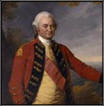Clive of India
The most famous "old boy of Allostock was Robert Clive. Clive was born in Market Drayton and was described as "bold and insubordinate". He ran a "gang" in Market Draytron, and probably Allostock, when he was living in Allostock and supposedly being tamed by his uncle at the school. Shop keepers were charged Y2 d protection money. His uncle however was obviously impressed by him and said "If opportunity enabled him to exert his talents few names would be greater than his".
In 1744 Clive went to India as a clerk with the East India Company and in 1746 gained a commission as an officer in the Indian Army. He made rapid progress by treaties with Indian princes against the French. He became a brilliant general and avenged the "Black Hole of Calcutta" (1756), at the Battle of Plassey in 1757. In 1758 he became Governor of Bengal.
 After a brief spell in England as an M.P., which he did not enjoy, he returned to India to govern Bengal. In 1767 Clive left India and survived a parliamentary enquiry in 1773 about accepting a cash reward and a seat in the House of Lords. His original contract with the East India Company offered him £70 a year. His personal fortune after 35 years was estimated at £400,000. he suffered life long bouts of depression and took his own life a year after the enquiry.
After a brief spell in England as an M.P., which he did not enjoy, he returned to India to govern Bengal. In 1767 Clive left India and survived a parliamentary enquiry in 1773 about accepting a cash reward and a seat in the House of Lords. His original contract with the East India Company offered him £70 a year. His personal fortune after 35 years was estimated at £400,000. he suffered life long bouts of depression and took his own life a year after the enquiry.
Robert Clive
1734 – 1736 Clive of India was educated in the school by his uncle, Rev. Dr. Samuel Eaton. It is rumoured that the Ministers and Clive himself lived at Chapel House (now Brook House Cottage/Brook Cottage, London Road).
Clive was responsible for seeing that the whole sub-continent became part of the British Empire and for ousting the French. His magnificent house in Shrewsbury, where he was twice Mayor, is now a museum. Despite some dubious aspects to his character, his portrait by Sir Nathaniel Dance hung in Allostock School in place of honour for many years
